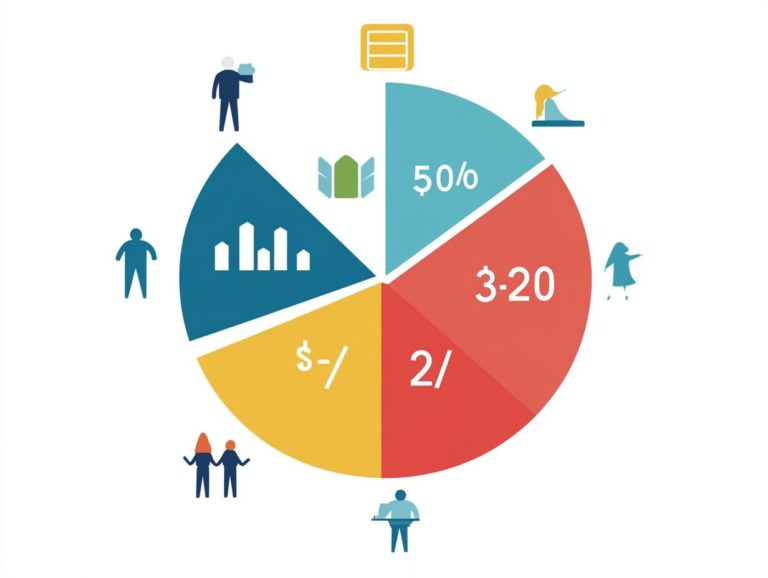What Should I Keep in Mind When Budgeting for Kids?
In today s world, educating children about money management is absolutely essential. As they grow, grasping concepts like budgeting, saving, and the true value of money can lay the groundwork for a secure financial future.
This article delves into vital age-appropriate lessons and activities, along with practical tips for creating and adhering to a budget. It also highlights key expenses to consider when budgeting for kids.
You will also find effective ways to teach the importance of saving and giving. Together, let’s empower the next generation with these indispensable financial skills!
Contents
- Key Takeaways:
- Why is it Important?
- Teaching Kids about Money Management
- Setting and Sticking to a Budget
- Expenses to Consider When Budgeting for Kids
- Teaching Kids the Value of Saving and Giving
- Frequently Asked Questions
- Wondering how to budget for your kids? Here are some essential tips!
- What should I keep in mind when budgeting for kids?
- Do I need to create a separate budget for my children?
- How can I involve my children in budgeting?
- What expenses should I include when budgeting for kids?
- How can I save money when budgeting for kids?
- What should I do if unexpected expenses come up for my children?
Key Takeaways:

- It is important to budget for kids to teach them about money management and instill good financial habits from a young age.
- Consider age-appropriate lessons and expenses when creating a budget with kids.
- Encourage saving and giving to help them develop a sense of responsibility and generosity.
Why is it Important?
Teaching children about money management is vital for their future success. It equips them with essential money skills that encourage smart spending, saving, and budgeting habits.
When they grasp these concepts early on, they re better prepared to make informed financial decisions, laying a strong foundation for their adult lives. In today s intricate financial landscape, instilling a positive attitude towards learning and growth while fostering positive financial habits gives kids the power to navigate challenges and sidestep common money missteps.
This strategy leads them to a more secure and financially sound future.
Teaching Kids about Money Management
Teaching kids about money management is a crucial step in equipping them with the financial skills they’ll need to thrive in adulthood. By introducing concepts like budgeting, saving, and spending from an early age, you can help them build a robust foundation in financial literacy.
This foundation will serve as a guiding principle for their money-related decisions throughout their lives.
Age-Appropriate Lessons and Activities
Age-appropriate lessons and activities are essential for effectively teaching essential financial literacy and money management skills. Tailoring these lessons to align with a child s developmental stage ensures that they grasp vital concepts like saving and spending, while also making the learning journey engaging and relatable.
For instance, younger children can thrive through interactive games that simulate shopping experiences, empowering them to make choices between items within a set budget. Activities such as establishing a simple piggy bank system can help them understand the difference between saving and spending in a tangible manner.
As they mature, incorporating activities like budgeting for a school event or a family outing encourages them to think critically about their financial decisions. Real-life examples, such as setting up a lemonade stand, not only make learning enjoyable but also provide practical insights into profit and loss, imparting valuable lessons in starting and running a business and financial responsibility.
Setting and Sticking to a Budget

Establishing and adhering to a budget is a crucial element of financial management that every child should grasp from an early age. This practice not only illuminates the significance of planning but also guides them in making informed financial decisions.
By teaching children how to craft a family budget, you empower them to monitor their income, expenses, and savings goals. This nurturing fosters responsible habits that will benefit them throughout their adult lives.
Tips for Creating a Budget with Kids
Creating a budget with your kids is a brilliant way to involve them in financial management while equipping them with essential skills that will serve them well throughout their lives. By bringing them into the budgeting process, you can show them how to prioritize expenses, set savings goals, and make informed financial choices. This ensures they truly grasp the value of money.
Engaging your children early in this budgeting journey helps them understand important concepts like distinguishing between needs and wants and appreciating the significance of delayed gratification (waiting to enjoy something later). One effective strategy is to hold family meetings dedicated to discussing monthly expenses and collaboratively setting financial objectives.
Utilizing visual tools, such as charts, can vividly illustrate their progress toward savings goals. This makes it more relatable for young minds. Introducing fun games or apps that simulate financial scenarios can spark their interest and enhance their understanding. This approach builds accountability and gives the power to your kids to take ownership of their financial decisions, laying a solid foundation for their future.
Expenses to Consider When Budgeting for Kids
Understanding the multitude of expenses you need to consider when budgeting for your kids is vital for making smart money choices. You should delve into not just the basic necessities but also the wants and activities that play a significant role in your child’s growth and development.
This encompasses education and after-school activities, as well as those special gifts that make childhood memorable. Prioritizing these elements ensures a well-rounded approach to your child’s upbringing while keeping your finances in check.
Education, Activities, and Other Costs
When budgeting for children, it s essential to consider various categories of expenses that can significantly impact your family s finances. These include education, activities, and other related costs. By understanding these expenses, you can plan effectively, ensuring your children access vital educational opportunities while also participating in enriching activities.
For example, educational costs often extend well beyond just tuition; they can encompass school supplies, textbooks, and extracurricular fees. All of which can accumulate rapidly. Activities like sports, music lessons, and summer camps offer invaluable experiences but can also put a strain on your budget if not carefully planned.
Don t overlook optional expenses such as field trips and special events. While these may add immense value to your child s experience, they might not be on your radar initially. Striking a balance with these expenses in your family budget is crucial. This way, your children can thrive academically and socially without the burden of overwhelming financial stress.
Teaching Kids the Value of Saving and Giving

Teaching kids the value of saving and giving is a crucial lesson that elevates their financial literacy while nurturing a sense of responsibility and ownership over their finances.
By instilling these principles early, they come to appreciate the importance of saving for future aspirations and recognize the significance of contributing to their community.
Start involving your kids in budgeting today!
Tips for Encouraging Saving and Giving Habits
Encouraging saving and giving habits in children is essential for their money skills, as it lays the groundwork for positive behaviors that will serve them well throughout life. By offering practical tips and engaging activities, you can inspire them to embrace these habits and understand their importance in achieving financial goals.
For example, setting up a clear savings jar can serve as a visual demonstration of the benefits of saving, allowing them to witness their progress firsthand.
Integrating simple ways to manage money, like dividing a monthly allowance into saving, spending, and giving, effectively teaches them how to manage expenses.
Engaging your kids in discussions about charitable organizations nurtures a sense of empathy and responsibility, reinforcing the significance of sharing resources. These activities help kids understand money management and equip them with the tools they need to navigate future financial decisions with confidence and responsibility.
Frequently Asked Questions
Wondering how to budget for your kids? Here are some essential tips!
What should I keep in mind when budgeting for kids?
Think about what your kids really need! When budgeting for kids, consider their age, needs, and any upcoming expenses such as school supplies or extracurricular activities.
Do I need to create a separate budget for my children?

It’s recommended to create a separate budget for your children to keep track of their expenses and ensure you are not overspending on their needs.
How can I involve my children in budgeting?
You can involve your children in budgeting by teaching them about money management and including them in decisions about their purchases.
What expenses should I include when budgeting for kids?
Some common expenses to include are groceries, clothing, education, extracurricular activities, and savings for future expenses.
How can I save money when budgeting for kids?
To save money while budgeting for kids, look for deals and sales, buy items in bulk, and involve your children in comparison shopping to find the best prices.
What should I do if unexpected expenses come up for my children?
If unexpected expenses arise, adjust your budget accordingly and cut back on non-essential expenses to cover the unexpected costs.






